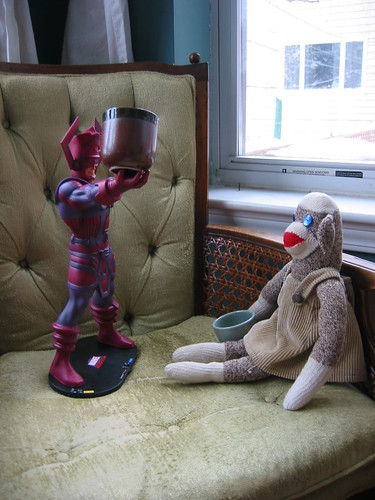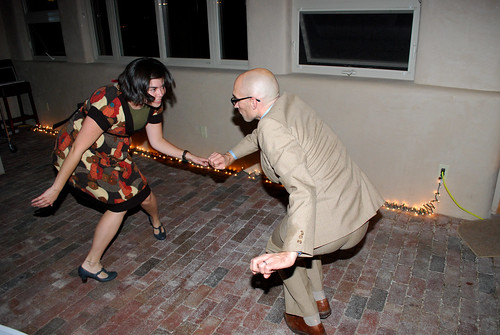While in the library recently to pick up a volume of Virginia Woolf's essays, I spied
a volume of her correspondence with Lytton Strachey that the Hogarth Press published in 1956. Tempted by its manageable slimness--it's not even two hundred pages long--I plucked it from the shelf, and I've been pleasantly rewarded for the decision as I wandered through it this weekend.
The correspondence is, while unquestionably friendly, at the same time a bit mannered; as Leonard Woolf and James Strachey note in their introduction,
[I]t occasionally gives an impression of self-consciousness--even of stiltedness--which was very far indeed from being usual in their letters. The fact was, no doubt, that each was a little wary of the other: in writing to each other they were always on their best behaviour, and never felt so much at ease as they did in their dealings with people whom they admired or respected less.
The resulting letters, however, give less the sense of guardedness or caution than they do of performance, of two people who, even as they dashed off notes, tried to bring all their intellect and wit to bear. What we lose in intimacy we gain in fun and insight; these are closer to, say, the composed, circumspect letters of E. B. White than they are to the endearing gushings of a Mitford sister.
Take, for example, this passage from a letter sent by Strachey on January 3, 1909. He had recently moved for a time to Rye, in Sussex,
spending the time since in a semi-stupor, among mists and golfers, so that by this time I'm feeling so much a la hashisch that I can hardly imagine that anywhere else exists. however, by an effort of will I can just bring to my mind a dim vision of Bond Street, the Heath, and a Square or two.
After some savage reflections on the idiocy of the local lawyers and clergy ("all golfers as well") and some reflections on Merimee, he notes,
Talking of Great Authors, I've seen Henry James twice since I came, and was immensely impressed. I mean only seen with the eye--I wish I knew him! He appeared at his window as I passed the other day--most remarkable! So conscientious and worried and important--he was like an admirable tradesman trying his best to give satisfaction, infinitely solemn and polite. Is there any truth in this? It has since occurred to me that his novels are really remarkable for their lack of humour. But I think it's very odd that he should have written precisely them and look precisely so. Perhaps if one talked to him one would understand.
It's unclear whether Strachey thinks James does or doesn't look like he ought to based on his novels; at a century's remove, he seems perfect for them, almost to the point of parody.
Woolf didn't address the question of James in her reply, but she did mention him in a letter of October 22, 1915:
I should think I had read 600 books since we met. Please tell me what you find in Henry James. I have disabused Leonard of him; but we have his works here, and I read, and can't find anything but faintly tinged rose water, urbane & sleek, but vulgar. . . Is there really any sense in it? I admit I can't be bothered to snuff out his meaning when it's very obscure.
More fun is the closing of her letter, which was written during a recuperation from one of her many bouts of poor health:
Nurse now thinks I must stop writing. I tell her I'm only scribbling to a relative, an elderly spinster, who suffers from gout, and lives on scraps of family news. "Poor thing!" says nurse. "Arthritis it is", I remark. But it won't do!
In another letter, sent from Richmond on July 25, 1916, Woolf offers an account of the difficulties of composition that ought to cheer any slow-working author:
My industry has the most minute results, and I begin to despair of finishing a book on this method--I write one sentence--the clock strikes--Leonard appears with a glass of milk.
Then there's this, from a letter she sent on October 12, 1918:
I'm extremely sorry to hear distressing accounts of your diseases. . . . However, you must consider that boils, blisters, rashes, green and blue vomits are all appointed by God himself to those whose books go into 4 editions within 6 months. Shingles, I can assure you, is only a first instalment; don't complain if the mange visits you, and the scurvy, and your feet swell and the dropsy distends and the scab itches--I mean you won't get any sympathy from me.
Later in the letter, she turns, as in most of the letters, to books:
I read the Greeks, but I am extremely doubtful whether I understand anything they say; also I have read the whole of Milton, without throwing any light upon my own soul, but that I rather like. Don't you think it very queer though that he entirely neglects the human heart? Is that the result of writing one's masterpiece at the age of 50? What about your masterpiece?
Strachey didn't answer the question, perhaps because he knew that he'd already published his masterpiece:
Eminent Victorians was at that time a mere five months old.
The letter wherein Strachey gave his first indications that he was kicking around ideas for kicking around the Victorians ("They seem to me a set of mouthing bungling hypocrites, but perhaps really there is a baroque charm about them which will be discovered by our great-grandchildren."), sent on November 8, 1912, quickly spins off into wonderfully vibrant visions of the future of literature:
I should like to live for another 200 years (to be moderate). The literature of the future will, I clearly see, be amazing. At last it'll tell the truth, and be indecent, and amusing, and romantic, and even (after about 100 years) be written well. Quelle joie!--To live in those days, when books will pour out from the press reeking with all the filth of Petronius, all the frenzy of Dostoievsky, all the romance of the Arabian Nights, and all the exquisiteness of Voltaire! But it won't only be the books that will be charming then.--The people!--The young men! . . . even the young women! . . .
In this age that seems to prefer professions of doom for the world of literature, Strachey's optimism, so gleefully expressed, is bracing.
Early in the correspondence, Woolf wrote to Strachey, "Really, if you go on writing, you will vitiate John Bailey's stock phrase, 'the art of letter writing is dying out--'." We should all be so lucky as to have such a correspondent; I'm fortunate enough to have a couple--and with Strachey's industry as my example, I'm off to put pen to paper. It's best not to enter the holiday season in arrears.


